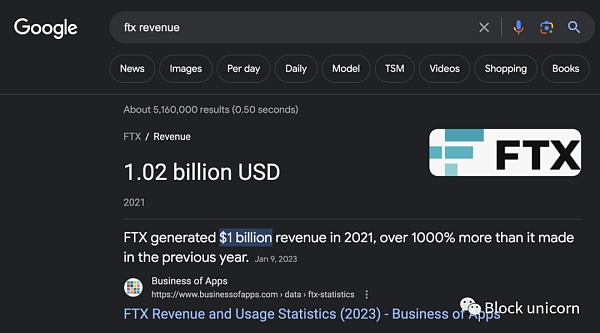Bloomberg proposes cryptocurrency regulatory framework, central bank issues "financial distributed ledger specifications"
Summary
U.S. Presidential candidate Michael Bloomberg proposes in the latest financial regulatory plan to create a clear regulatory framework for cryptocurrencies. According to coindesk, he asked financial institutions to monitor risk exposure, record all financial transactions in a centralized database, and strengthen the consumer financial protection bureau's working ability. Michael Bloomberg said that cryptocurrencies have become hundreds of billions of dollars in asset classes, but regulatory oversight is still very lax and unfamiliar with the field. There is also a lot of hype, fraud, and criminal activity in the areas of blockchain, bitcoin, and initial token issuance. In the financial reform plan, Michael Bloomberg believes it is necessary to clarify which institutions should be responsible for overseeing the cryptocurrency and blockchain industry, while establishing a framework to confirm when tokens will be identified as securities in order to protect consumption Protect against cryptocurrency-related fraud, clarify the crypto tax system, and determine the requirements of the crypto industry for financial institutions.
The Central Bank released the "Technical Security Specifications for Financial Distributed Ledgers", and the development of blockchain finance is expected to accelerate. Recently, the Financial Industry Standards for Financial Distributed Ledger Technical Security Standards (JR / T 0184-2020) was officially issued by the People's Bank of China. The standard specifies the security system of financial distributed ledger technology, including basic hardware, basic software, cryptographic algorithms, node communication, ledger data, consensus protocols, smart contracts, identity management, privacy protection, regulatory support, operation and maintenance requirements, and governance mechanisms, etc. aspect. The standard is applicable to institutions engaged in the construction or service operation of distributed ledger systems in the financial field. Distributed ledger technology is a distributed infrastructure and computing paradigm formed by the highly integrated core technologies such as cryptographic algorithms, consensus mechanisms, point-to-point communication protocols, and distributed storage. The distributed ledger technology is the underlying technology of the blockchain. The release of the specification will further promote the development of the central bank's digital currency and blockchain supply chain finance.
Coinbase becomes a Visa Master Member: You can issue debit cards without relying on a third party. Cryptocurrency exchange Coinbase has announced that it has become the Principal Membership of payment giant Visa, which means that they can issue debit cards without relying on a third party. The value of the carbon chain has learned that Coinbase has partnered with Visa to issue a debit card called the "Coinbase Card" that allows customers residing in the European Union or the European Community to pay in cryptocurrencies. As a representative of global compliance exchanges, Coinbase's cooperation with traditional financial payment institutions shows that the cryptocurrency industry is embracing compliance. We can expect that in the future, cryptocurrencies can also circulate in some areas like traditional financial assets, providing investment options for qualified investors.
- Ant Blockchain latest technology thinking: cross-chain standards, hardware, and IoT convergence have become three major trends
- Vitalik Buterin criticizes developers for their decision-making process on ProgPow and is neutral on the proposal
- Say good hedging, have you persuaded Bitcoin?
Last week's market review: Chainext CSI 100 rose 0.75%, and the storage & computing performance in the segment was the best. From the perspective of subdivisions, the performance of entertainment and social networking, commercial finance, basic chain, storage & computing, and pure currency are all better than the average level of Chainext CSI 100, which are 1.67%, 5.1%, 6.87%, 7.94%, and 1.3%, respectively; Payment transactions, Internet of Things & traceability, foundation enhancements, and AI performance were inferior to the Chainext CSI 100 average levels of -0.88%, 0.51%, -0.61%, and -4.91%, respectively.
Risk Warning : Uncertainty in regulatory policies, and the development of blockchain infrastructure is not up to expectations.
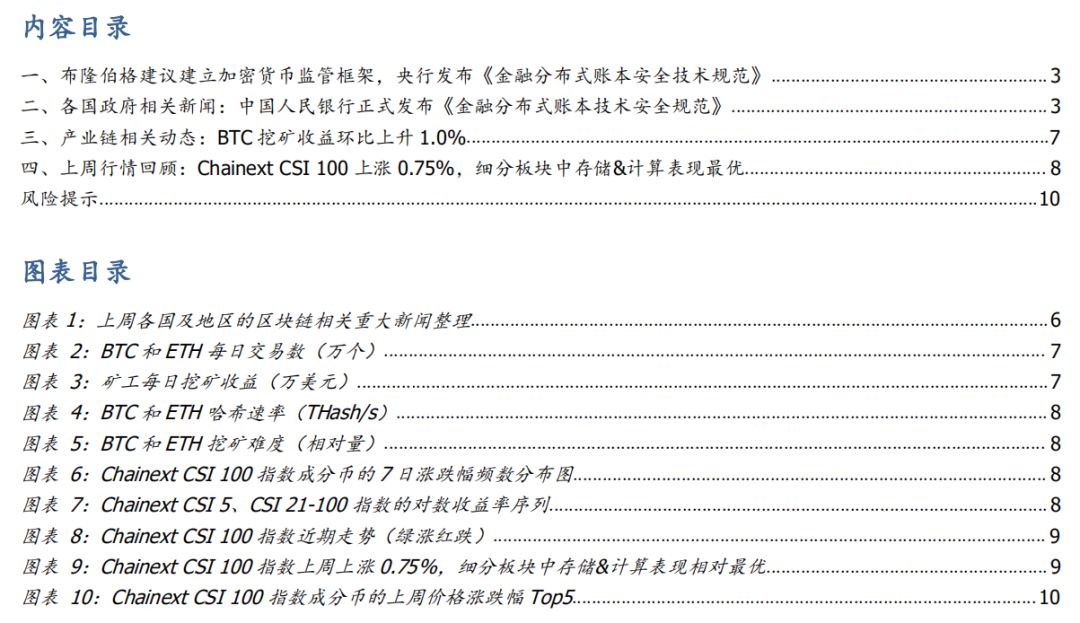
U.S. Presidential candidate Michael Bloomberg proposes in the latest financial regulatory plan to create a clear regulatory framework for cryptocurrencies. According to coindesk, Bloomberg asked financial institutions to monitor risk exposure, record all financial transactions in a centralized database, and strengthen the consumer financial protection bureau's ability to work. Michael Bloomberg said that cryptocurrencies have become hundreds of billions of dollars in asset classes, but regulatory oversight is still very lax and unfamiliar with the field. There is also a lot of hype, fraud, and criminal activity in the areas of blockchain, bitcoin, and initial token issuance. In the financial reform plan, Michael Bloomberg believes it is necessary to clarify which institutions should be responsible for overseeing the cryptocurrency and blockchain industry, while establishing a framework to confirm when tokens will be identified as securities in order to protect consumption Protect against cryptocurrency-related fraud, clarify the crypto tax system, and determine the requirements of the crypto industry for financial institutions.
The Central Bank released the "Technical Security Specifications for Financial Distributed Ledgers", and the development of blockchain finance is expected to accelerate. Recently, the Financial Industry Standards for Financial Distributed Ledger Technical Security Standards (JR / T 0184-2020) was officially issued by the People's Bank of China. The standard specifies the security system of financial distributed ledger technology, including basic hardware, basic software, cryptographic algorithms, node communication, ledger data, consensus protocols, smart contracts, identity management, privacy protection, regulatory support, operation and maintenance requirements, and governance mechanisms, etc. aspect. The standard is applicable to institutions engaged in the construction or service operation of distributed ledger systems in the financial field. Distributed ledger technology is a distributed infrastructure and computing paradigm formed by the highly integrated core technologies such as cryptographic algorithms, consensus mechanisms, point-to-point communication protocols, and distributed storage. The distributed ledger technology is the underlying technology of the blockchain. The release of the specification will further promote the development of the central bank's digital currency and blockchain supply chain finance. As a tamper-resistant and traceable database ledger, the blockchain can ensure the authenticity of the data chain; however, online and offline integration alone cannot be solved independently by blockchain technology. By combining with the Internet of Things, AI and other technologies to complete deep binding online and offline, the transparency of goods circulation, data chain, and credit transfer is further promoted to facilitate supply chain financing and improve efficiency. Blockchain, as an encrypted distributed ledger, will be applied to DCEP's circulation system and application market from cost reduction, secure encryption, fastness, etc.
Coinbase becomes a Visa Master Member: You can issue debit cards without relying on a third party. Cryptocurrency exchange Coinbase has announced that it has become the Principal Membership of payment giant Visa, which means that they can issue debit cards without relying on a third party. The value of the carbon chain has learned that Coinbase has partnered with Visa to issue a debit card called the "Coinbase Card" that allows customers residing in the European Union or the European Community to pay in cryptocurrencies. It is reported that although the debit card supports global use, its current use is mainly concentrated in the United Kingdom, followed by Italy, Spain and France. As a representative of global compliance exchanges, Coinbase's cooperation with traditional financial payment institutions shows that the cryptocurrency industry is embracing compliance. We can expect that in the future, cryptocurrencies can also circulate in some areas like traditional financial assets, providing investment options for qualified investors.
India: Recently, Indian IT giant Tech Mahindra has partnered with the government of Telangana (Telengana State) to launch a blockchain accelerator. The new "T-Block Accelerator" is designed to cultivate blockchain startups that have identified actual use cases for the technology and to promote industry growth in general. It is reported that the plan was formulated in a memorandum of understanding (MoU) signed by the Telangana government and Tech Mahindra in 2018.
Japan: On February 22nd, the Japanese Ministry of Finance, the Ministry of Finance and the Bank of Japan have held a meeting to discuss the issue of digital currency of the central bank in order to promote the study of possible digital currency issued by the central bank. February 21st, Japan Virtual Currency Exchange Association (JVCEA) is about to make a constitutional change based on the revised fund settlement algorithm. The change is mainly to change the name of "virtual currency" to "crypto assets", and also includes the name of the association group Changed to "Japan Crypto Asset Exchange Association", the purpose of the association was modified to "ensure the proper and smooth implementation of the crypto asset exchange industry and crypto asset related derivative transaction industry conducted by members, which will help its healthy development and protect users and "Investors". In addition, although the current category 1 members are virtual currency exchange companies, according to the clear regulations of the revised regulations, crypto asset-related derivatives trading and custody companies are also eligible. February 18th, the Japan New Economic Union put forward four opinions to the Japan Financial Services Agency on the regulatory policy of STO and cryptocurrency derivatives, including: exemption from the requirement of "electronic record transfer right"; hoping to balance the system with reference to US securities regulations Balance; the leverage of cryptocurrency derivatives is set to four times the current level, or for different currencies; indicates how to calculate market risk equivalents, counterparty risk equivalents, and basic risk equivalents for financial instrument operators.
Russia: On February 17, the Russian central bank announced that it had successfully completed the piloting of a blockchain platform for digital rights distribution and transfer. The project is part of the country's central bank's regulatory sandbox. The platform allows the digitization (tokenization) of goods, services, securities and other assets, one of which is the ability to issue hybrid tokens using various assets as collateral. Any organization can issue digital tokens through the platform, which will expand business opportunities to attract investment and create new investment tools. The blockchain platform was developed by Norilsk Nickel (referred to as Nornickel). Once the "digital financial assets" law comes into effect, the platform will begin operation.
Malta: Malta's regulator, the Financial Services Authority (MFSA), issued a statement denying that Binance, the major cryptocurrency exchange, has obtained a license to operate cryptocurrency operations in the country, and stated that Binance is also not regulated in the country. The MFSA said that although Binance Exchange has been referred to as "Malta-based cryptocurrency company" by the media, the regulator announced that "Binance has not been authorized by the MFSA to operate in the cryptocurrency space and therefore is not subject to MFSA supervision."
Brazil: February 20th, the Brazilian central bank will launch a new payment system PIX to deal with cryptocurrencies. The project will provide 24/7 payment services through mobile applications, Internet banking and ATMs within 10 seconds. It is expected to be available in Launched on November 10, 2020. The central bank's governor, Roberto Campos Neto, said at the launch of the system that the PIX was developed to address new digital payment methods such as cryptocurrencies.
Nigeria: On February 19th, Nigeria launched the country's first Bitcoin ATM. This device was provided by BlockStale and is a device specifically tailored for the African market. It is reported that this bitcoin ATM is different from other countries. It does not accept debit cards, credit cards, nor support Mastercard and Visa cards. It can only use cash-the Nigerian legal currency Naira to pay for purchases. BlockStale CEO Daniel Adekunle revealed that the requirements of the Central Bank of Nigeria were taken into consideration this time, because Bitcoin ATM operators and sellers are neither banks nor financial inclusive institutions, so they cannot accept bank cards, only fiat currencies.
South Korea: February 18th, the industry revealed that the Bank of Korea has selected operating companies at the end of last year and has been developing a blockchain bond system. The difference between blockchain bonds and current bonds is that the records entrusted to the clearing house will be converted into a distributed ledger format and can be shared to multiple nodes at the same time through blockchain technology. However, it may take a long time to fully introduce blockchain bonds. The test is currently in the proof-of-concept stage.
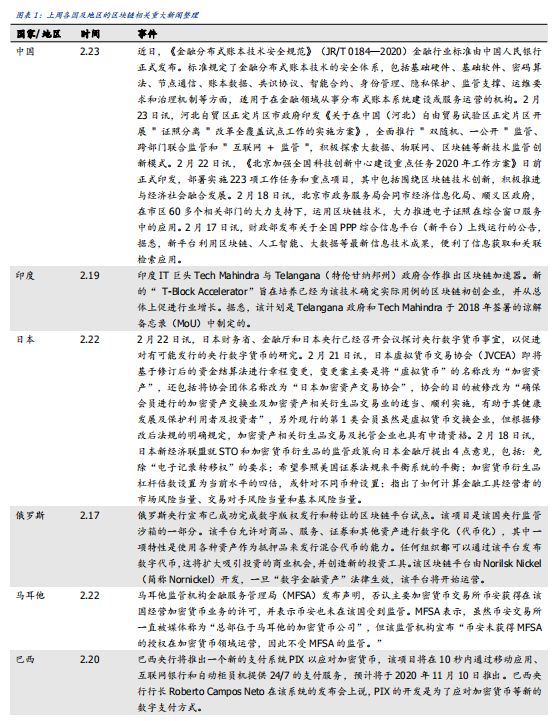

Last week, BTC added 2.25 million transactions, down 1.6% from the previous month; ETH added 4.7 million transactions, down 7.4% from the previous month.
Last week, the average daily income of BTC miners was 18.18 million US dollars, an increase of 1.0% from the previous month; the average daily income of ETH miners was 2.91 million US dollars, an increase of 3.0% from the previous month.
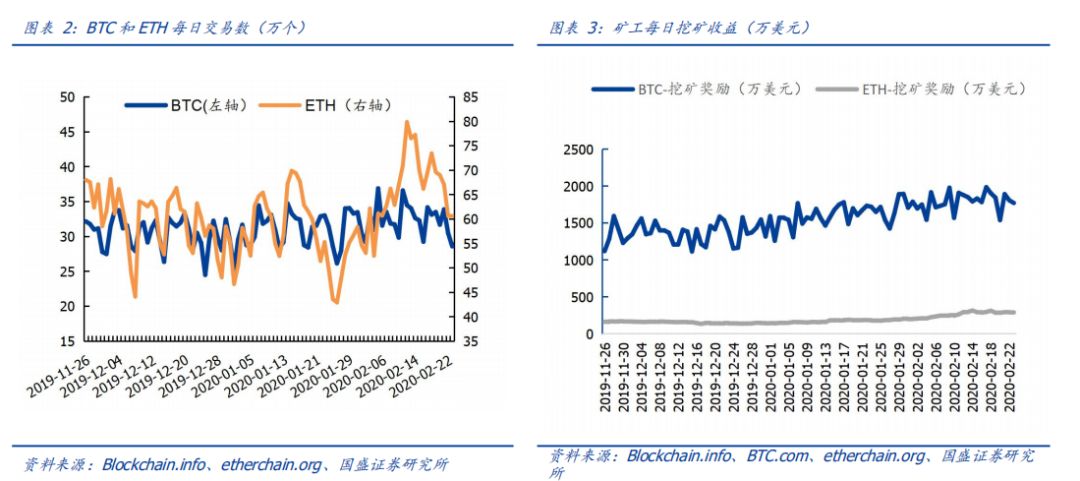
Last week's BTC network-wide mining difficulty was 15.55T, an increase of 0.1% from the previous month. The next difficulty adjustment date is February 25, and the expected difficulty value is 15.37 T (-1.17%). Last week, the average ETH network-wide mining difficulty was 2.26T, an increase of 3.8%.
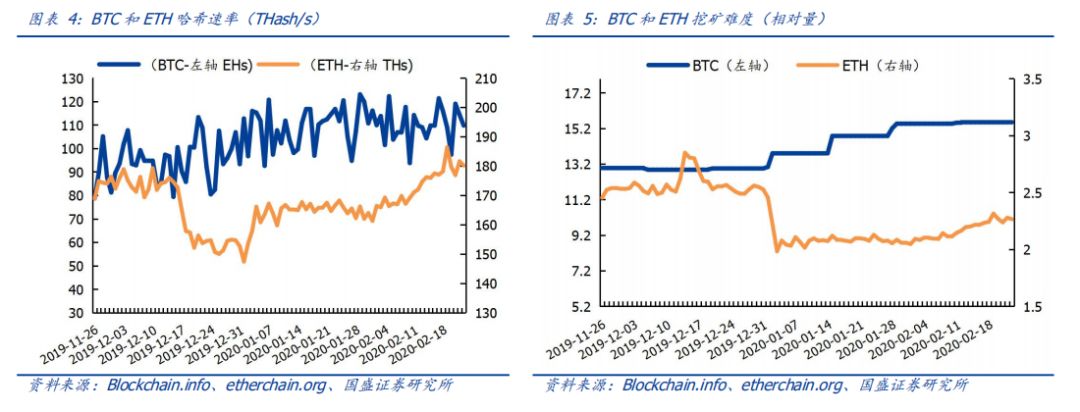
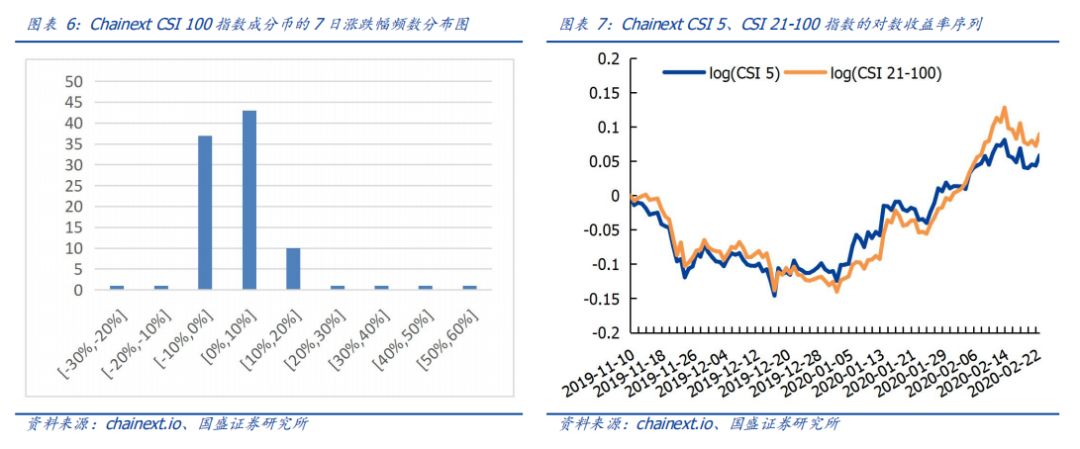
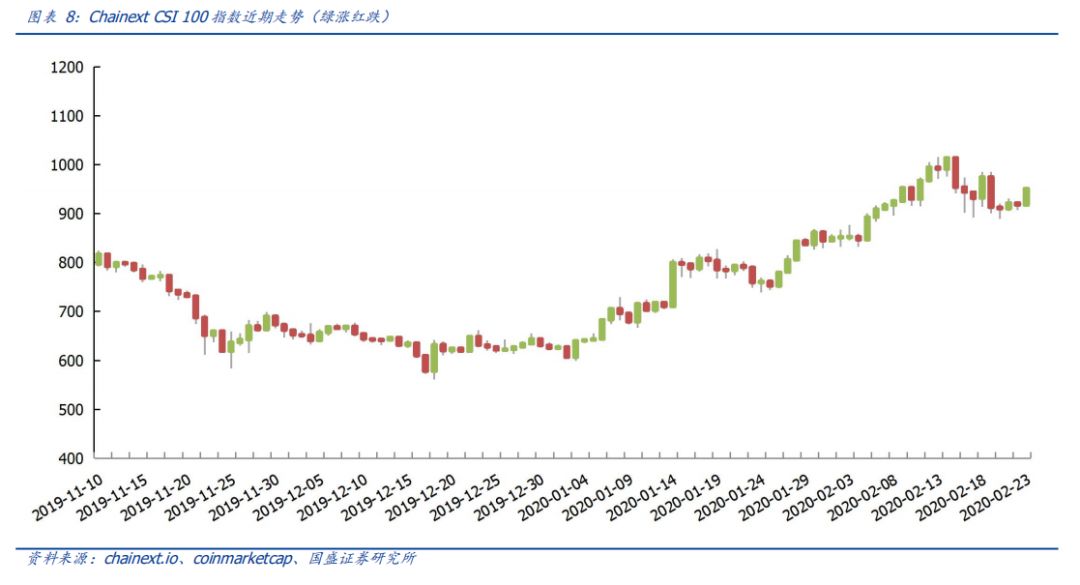
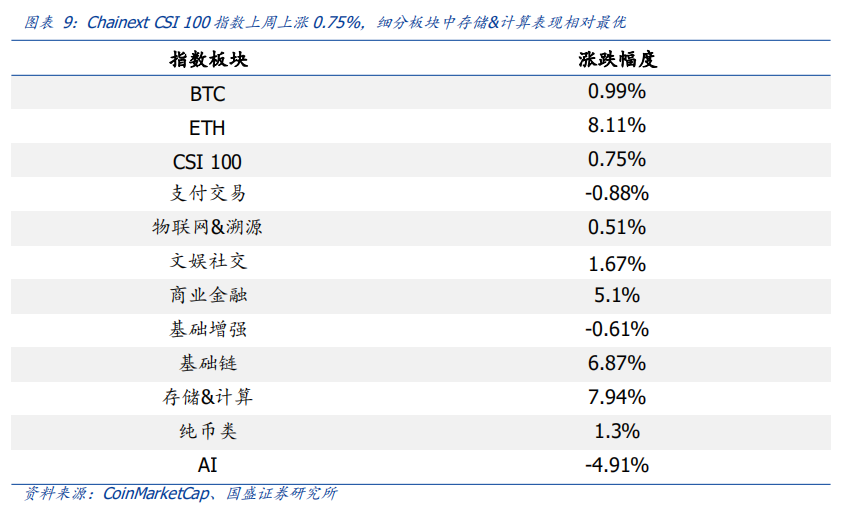

The development of blockchain infrastructure failed to meet expectations. Blockchain is the core technology for solving supply chain finance and digital identity. At present, the blockchain infrastructure cannot support high-performance network deployment. The degree of decentralization and security will have a certain restriction on high performance. The blockchain infrastructure exists The risk of developing less than expected.
We will continue to update Blocking; if you have any questions or suggestions, please contact us!
Was this article helpful?
93 out of 132 found this helpful
Related articles
- Overview of Ethereum Account Abstraction: What is the significance and how long will it take to achieve it?
- Skyrocketing 126.97%, Blockchain concept stocks Quartet shareholders reduce cash holdings by nearly 200 million yuan
- CBInsights fintech development report: central bank joins pilot digital currency, Fidelity bets on cryptocurrency through incubation project
- Silicon Valley investor Tim Draper: I have a lot of bitcoin, Buffett doesn't like bitcoin for personal gain
- 60-page chart data takes you to understand the NFT industry in 2019
- Li Lihui: Facing the challenge of the epidemic, using blockchain and other technologies to promote the full implementation of digital finance
- Valuing DeFi tokens? Look at the head DeFi token price-earnings ratio and future value analysis





